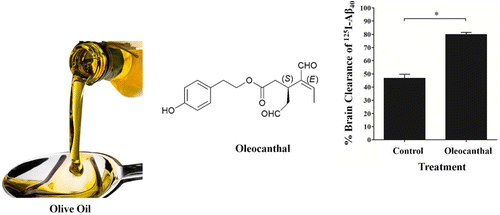The mystery of exactly how consumption of extra virgin olive oil helps reduce the risk of Alzheimer's disease (AD) may lie in one component of olive oil that helps shuttle the abnormal AD proteins out of the brain, scientists are reporting in a new study. It appears in the journal ACS Chemical Neuroscience.
Amal Kaddoumi and colleagues note that AD affects about 30 million people worldwide, but the prevalence is lower in Mediterranean countries. Scientists once attributed it to the high concentration of healthful monounsaturated fats in olive oil—consumed in large amounts in the Mediterranean diet. Newer research suggested that the actual protective agent might be a substance called oleocanthal, which has effects that protect nerve cells from the kind of damage that occurs in AD. Kaddoumi's team sought evidence on whether oleocanthal helps decrease the accumulation of beta-amyloid (Aβ) in the brain, believed to be the culprit in AD.
They describe tracking the effects of oleocanthal in the brains and cultured brain cells of laboratory mice used as stand-ins for humans in such research. In both instances, oleocanthal showed a consistent pattern in which it boosted production of two proteins and key enzymes believed to be critical in removing Aβ from the brain. "Extra-virgin olive oil-derived oleocanthal associated with the consumption of Mediterranean diet has the potential to reduce the risk of AD or related neurodegenerative dementias," the report concludes.
More information: "Olive-Oil-Derived Oleocanthal Enhances β-Amyloid Clearance as a Potential Neuroprotective Mechanism against Alzheimer's Disease: In Vitro and in Vivo Studies" ACS Chem. Neurosci., Article ASAP. DOI: 10.1021/cn400024q
Abstract
Oleocanthal, a phenolic component of extra-virgin olive oil, has been recently linked to reduced risk of Alzheimer's disease (AD), a neurodegenerative disease that is characterized by accumulation of β-amyloid (Aβ) and tau proteins in the brain. However, the mechanism by which oleocanthal exerts its neuroprotective effect is still incompletely understood. Here, we provide in vitro and in vivo evidence for the potential of oleocanthal to enhance Aβ clearance from the brain via up-regulation of P-glycoprotein (P-gp) and LDL lipoprotein receptor related protein-1 (LRP1), major Aβ transport proteins, at the blood-brain barrier (BBB). Results from in vitro and in vivo studies demonstrated similar and consistent pattern of oleocanthal in controlling Aβ levels. In cultured mice brain endothelial cells, oleocanthal treatment increased P-gp and LRP1 expression and activity. Brain efflux index (BEI%) studies of 125I-Aβ40 showed that administration of oleocanthal extracted from extra-virgin olive oil to C57BL/6 wild-type mice enhanced 125I-Aβ40 clearance from the brain and increased the BEI% from 62.0 ± 3.0% for control mice to 79.9 ± 1.6% for oleocanthal treated mice. Increased P-gp and LRP1 expression in the brain microvessels and inhibition studies confirmed the role of up-regulation of these proteins in enhancing 125I-Aβ40 clearance after oleocanthal treatment. Furthermore, our results demonstrated significant increase in 125I-Aβ40 degradation as a result of the up-regulation of Aβ degrading enzymes following oleocanthal treatment. In conclusion, these findings provide experimental support that potential reduced risk of AD associated with extra-virgin olive oil could be mediated by enhancement of Aβ clearance from the brain.
Journal information: ACS Chemical Neuroscience
Provided by American Chemical Society


















